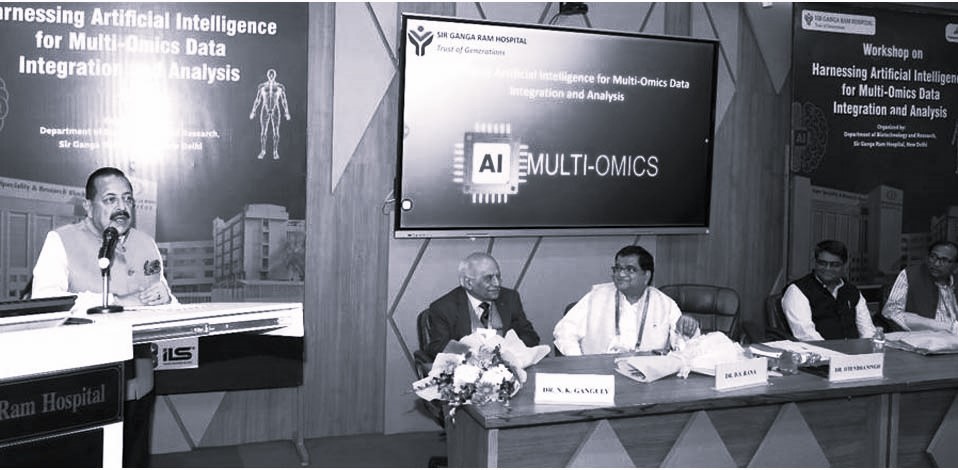
India’s biomedical leap: From Genome sequencing to world-class antibiotics
In a landmark stride toward scientific self-reliance, Union Minister of State (Independent Charge) for Science & Technology, Dr. Jitendra Singh, today announced that India has developed its first indigenously discovered antibiotic Nafithromycin, a breakthrough that strengthens the nation’s position in advanced biomedical research and innovation.
Speaking at the inauguration of a three-day Medical Workshop on “Harnessing Artificial Intelligence for Multi-Omics Data Integration and Analysis,” It was stated by Dr. Singh that a self-sustainable ecosystem must be developed by India to drive its scientific and research growth, and that global recognition in science and innovation has been achieved by most nations through self-sustaining, innovation-driven models with extensive engagement of the private sector.
India’s First Homegrown Antibiotic:
The antibiotic Nafithromycin, developed by the Department of Biotechnology (DBT) under the Government of India in collaboration with Wockhardt Ltd, is effective against resistant respiratory infections and is particularly beneficial for cancer patients and individuals with poorly controlled diabetes.
Dr. Singh highlighted that this molecule is the first antibiotic fully conceptualized, developed, and clinically validated in India, marking a “significant leap toward self-reliance in the pharmaceutical sector.”
It was referred to as an example of a successful industry-academia partnership, and it was stated that India’s biopharmaceutical growth can be driven by collaboration between the government and private sector. It was further emphasized that a self-sustainable innovation ecosystem must now be built, one that encourages private sector participation and philanthropic support to achieve global recognition in research and innovation.
Breakthrough in Gene Therapy for Hemophilia:
Dr. Singh also announced another milestone: India's first successful indigenous clinical trial in gene therapy for Hemophilia, supported by the Department of Biotechnology and conducted at Christian Medical College (CMC), Vellore. The Minister revealed that the trial achieved a 60–70% correction rate and recorded zero bleeding episodes, representing a “major breakthrough in India’s medical research landscape.”
He added that the findings have been published in the New England Journal of Medicine, underscoring “India’s growing leadership in advanced biomedical innovation.”
Human Genome Sequencing Milestone:
Highlighting India’s expanding capabilities in genomic research, Dr. Singh stated that the country has already sequenced over 10,000 human genomes and aims to scale this up to one million in the coming years.
He said this large-scale genome mapping effort will accelerate precision medicine and enhance understanding of disease patterns specific to India’s population, thereby driving the future of personalized healthcare.
Anusandhan National Research Foundation (ANRF): A Paradigm Shift in R&D Funding
Dr. Jitendra Singh emphasized that the newly established Anusandhan National Research Foundation (ANRF) is a transformative step toward self-sustained research financing and innovation.
It was stated that the Anusandhan National Research Foundation (ANRF) is considered a major step in this direction, with a total outlay of ₹50,000 crore over five years, of which ₹36,000 crore will be contributed from non-government sources. It was further mentioned that this model is viewed as reflecting a paradigm shift in India’s approach to research and development, aligning it with global standards and emphasizing greater participation from academia and industry.
AI Integration in Healthcare and Governance:
Calling Artificial Intelligence (AI) one of the most transformative tools of the modern era, Dr. Singh said, _“AI is reshaping healthcare accessibility, governance efficiency, and decision-making.”_ He noted that AI-based hybrid mobile clinics are already serving rural and remote regions, ensuring equitable healthcare delivery across the nation.
Further, he highlighted the AI-driven grievance redressal system developed by the Department of Administrative Reforms and Public Grievances (DARPG), which has achieved a 97–98% weekly disposal rate, significantly improving citizen satisfaction and service delivery.
Interdisciplinary Collaboration and Vision for Viksit Bharat @2047:
Dr. Jitendra Singh lauded institutions such as Sir Ganga Ram Hospital for pioneering interdisciplinary approaches that integrate AI, biotechnology, and genomics to enhance healthcare outcomes.
He urged stronger collaboration between government departments, private hospitals, and research institutes, saying, _“The convergence of innovation, collaboration, and compassion will define India’s journey toward a developed nation and establish its leadership in the global science and technology landscape.”_
Dr. Singh reaffirmed that India is “entering a new era of self-reliance in biotechnology, AI, and genomic medicine,” and that the combined strength of these fields will guide the nation toward the vision of Viksit Bharat @2047.
Dignitaries Present:
The event was also attended by Dr. Shiv Kumar Kalyanaraman, CEO of the Anusandhan National Research Foundation, along with eminent scientists and healthcare leaders including Dr. N.K. Ganguly, Dr. D.S. Rana, and Dr. Ajay Swaroop.
Clinical development:
The clinical development of India’s first indigenous antibiotic, Nafithromycin, began with a Phase III trial registered in India on December 31, 2019, comparing the drug with moxifloxacin for the treatment of community-acquired bacterial pneumonia (CABP). Earlier preclinical and smaller Phase I/II studies are believed to have been conducted before this registration, as part of the molecule’s development by the Department of Biotechnology (DBT) and Wockhardt. Meanwhile, the gene therapy trial for Hemophilia A, which marks India’s first successful indigenous gene therapy experiment, was initiated around April 2022, according to records from the Clinical Trials Registry of India (CTRI). The study, supported by the DBT and conducted at the Christian Medical College (CMC), Vellore, involved a small cohort of patients and was later reported in December 2024 after demonstrating promising outcomes with a 60–70% correction rate and zero bleeding episodes. Both trials collectively reflect India’s increasing capabilities in advanced biomedical research and its shift toward indigenous innovation in drug discovery and gene therapy.
India’s twin achievements, the development of Nafithromycin, the first homegrown antibiotic, and the successful gene therapy trial for Hemophilia together signify a turning point in the nation’s biomedical evolution. Coupled with the push for AI-driven healthcare and the launch of ANRF, the announcements represent India’s decisive transition from a research-dependent nation to a global leader in innovation, technology, and scientific self-reliance.
